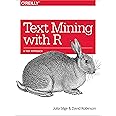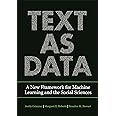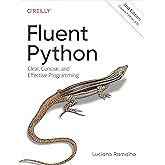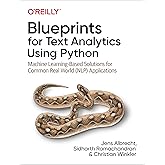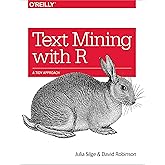Buy new:
$78.05$78.05
Dispatched from: Amazon AU Sold by: Amazon AU
Save with Used - Very Good
$47.73$47.73
Dispatched from: Ultimate Treasures AU Sold by: Ultimate Treasures AU

Download the free Kindle app and start reading Kindle books instantly on your smartphone, tablet or computer—no Kindle device required.
Read instantly on your browser with Kindle for Web.
Using your mobile phone camera, scan the code below and download the Kindle app.

Follow the authors
OK
Applied Text Analysis with Python: Enabling Language-Aware Data Products with Machine Learning Paperback – 31 July 2018
You can select and apply an appropriate plan based on your cart value at checkout.
-
3-12 mo instalmentsLatitude
-
Pay at Your PaceZip
| Payment options | Interest | Total* |
|---|---|---|
| $26.02/mo (3 mo) minimum purchase of $50 | 0% | $78.05 |
** Latitude: Monthly credit card fee (currently $10.95) will apply. Equal monthly repayments apply, account fees, late fees apply. Provider may charge interest. Exclusions apply. For more details click on Learn more above. You acknowledge that credit is provided to you by Latitude Finance Australia ABN 42 008 583 588, Australian Credit Licence number 392145, and the instalment plan is subject to the terms and conditions imposed on you by Latitude. Equal monthly repayments apply (exact amounts specified in your Latitude statement) and card fees will be charged by Latitude. If you fail to make your minimum monthly payment for two consecutive months, you agree that your equal monthly payment plans (Instalment Interest Free Promotion) with a term of fewer than 33 months will change into a minimum monthly payment plan (Interest Free Promotion) for the remaining duration of the initial plan term. If you fail to make a payment on time, Latitude will charge late fees. Latitude will also charge interest on any outstanding balance at the end of the instalment plan period you select at the rate set out in its T&Cs (currently 29.99% p.a.). Interest may also apply to other Latitude credit card transactions or if you do not comply with the Latitude T&Cs.
| Account type | Interest |
|---|---|
| Zip Pay | Always interest free^ |
| Zip Money | 6 mo interest free,
25.9% p.a. thereafter* |
^Zip Pay: Minimum monthly repayments are required. A monthly account fee of $9.95 applies and is subject to change. Pay your closing balance in full by the due date each month and we’ll waive the fee. Available to approved applicants only and subject to completion of satisfactory credit check. Other charges may be payable. Fees and charges subject to change. T&Cs apply.
*Zip Money: Interest free term subject to minimum spend and promotional partner offer. Available to approved applicants only and subject to completion of satisfactory credit check. The repayment advertised will repay the transaction balance within the advertised interest free period. A monthly account fee of $9.95 applies and a one off establishment fee may apply for new customers. Under the contract, minimum monthly repayments are required and will vary depending on your credit limit. Instalment plans split eligible purchases of $300 and above into equal repayments within the interest free period. If you turn off instalments, transactions will be reverted to the minimum monthly repayment. Paying only the minimum monthly repayment may not necessarily repay a purchase within the interest free period. Any balance outstanding at the expiry of the interest free period will be charged at the standard variable interest rate, 25.9% per annum, as at 1 June 2023. Other charges may be payable, see T&Cs. Interest, fees and charges are subject to change. Terms & Conditions apply and are available on application. See your contract for further details. Credit provided by ZipMoney Payments Pty Ltd (ABN 58 164 440 993), Australian Credit Licence Number (441878).
Purchase options and add-ons
From news and speeches to informal chatter on social media, natural language is one of the richest and most underutilized sources of data. Not only does it come in a constant stream, always changing and adapting in context; it also contains information that is not conveyed by traditional data sources. The key to unlocking natural language is through the creative application of text analytics. This practical book presents a data scientist's approach to building language-aware products with applied machine learning.
You'll learn robust, repeatable, and scalable techniques for text analysis with Python, including contextual and linguistic feature engineering, vectorization, classification, topic modeling, entity resolution, graph analysis, and visual steering. By the end of the book, you'll be equipped with practical methods to solve any number of complex real-world problems.
- Preprocess and vectorize text into high-dimensional feature representations
- Perform document classification and topic modeling
- Steer the model selection process with visual diagnostics
- Extract key phrases, named entities, and graph structures to reason about data in text
- Build a dialog framework to enable chatbots and language-driven interaction
- Use Spark to scale processing power and neural networks to scale model complexity
- ISBN-101491963042
- ISBN-13978-1491963043
- Edition1st
- PublisherO'Reilly Media
- Publication date31 July 2018
- LanguageEnglish
- Dimensions17.78 x 1.52 x 22.86 cm
- Print length330 pages
Frequently bought together
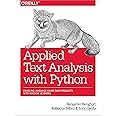
What other items do customers buy after viewing this item?
From the Publisher

From the Preface
What to Expect from This Book
In this book, we focus on applied machine learning for text analysis using the Python libraries just described. The applied nature of the book means that we focus not on the academic nature of linguistics or statistical models, but instead on how to be effective at deploying models trained on text inside of a software application.
The model for text analysis we propose is directly related to the machine learning workflow—a search process to find a model composed of features, an algorithm, and hyperparameters that best operates on training data to produce estimations on unknown data. This workflow starts with the construction and management of a training dataset, called a corpus in text analysis. We will then explore feature extraction and preprocessing methodologies to compose text as numeric data that machine learning can understand. With some basic features in hand, we explore techniques for classification and clustering on text, concluding the first few chapters of the book.
The latter chapters focus on extending models with richer features to create text-aware applications. We begin by exploring how context can be embedded as features, then move on to a visual interpretation of text to steering the model selection process. Next, we examine how to analyze complex relationships extracted from text using graph analysis techniques.
We then change focus to explore conversational agents and deepen our understanding of syntactic and semantic analysis of text. We conclude the book with a practical discussion of scaling text analysis with multiprocessing and Spark, and finally, we explore the next phase of text analytics: deep learning.

Who This Book Is For
This book is for Python programmers who are interested in applying natural language processing and machine learning to their software development toolkit. We don’t assume any special academic background or mathematical knowledge from our readers, and instead focus on tools and techniques rather than lengthy explanations. We do primarily analyze the English language in this book, so basic grammatical knowledge such as how nouns, verbs, adverbs, and adjectives are related to each other is helpful. Readers who are completely new to machine learning and linguistics but have a solid understanding of Python programming will not feel overwhelmed by the concepts we present.
Product description
About the Author
Dr. Rebecca Bilbro is a data scientist, Python programmer, and author in Washington, DC. She specializes in data visualization for machine learning, from feature analysis to model selection and hyperparameter tuning. She is an active contributor to the open source community and has conducted research on natural language processing, semantic network extraction, entity resolution, and high dimensional information visualization. She earned her doctorate from the University of Illinois, Urbana-Champaign, where her research centered on communication and visualization practices in engineering.
Tony is the founder of District Data Labs and focuses on applied analytics for business strategy. He has published a book on practical data science, and has experience with hands-on education and data science curricula.
Product details
- Publisher : O'Reilly Media
- Publication date : 31 July 2018
- Edition : 1st
- Language : English
- Print length : 330 pages
- ISBN-10 : 1491963042
- ISBN-13 : 978-1491963043
- Item weight : 544 g
- Dimensions : 17.78 x 1.52 x 22.86 cm
- Customer Reviews:
About the authors

Tony Ojeda is an accomplished manager and entrepreneur with expertise in business process optimization and over a decade of experience creating and implementing innovative data products and solutions. He has a Masters in Finance from Florida International University and an MBA focusing on Strategy and Entrepreneurship from DePaul University. He is the founder of District Data Labs, a co-founder of Data Community DC, and is actively involved in promoting data science education through both organizations.

Benjamin Bengfort is a Data Scientist who lives inside the beltway but ignores politics (the normal business of DC) favoring technology instead. He is currently working to finish his PhD at the University of Maryland where he studies machine learning and artificial intelligence. His lab does have robots (though this field of study is not one he favors) and, much to his chagrin, they seem to constantly arm said robots with knives and tools; presumably to pursue culinary accolades. Having seen a robot attempt to slice a tomato, Benjamin prefers his own adventures in the kitchen where he specializes in fusion French and Guyanese cuisine as well as BBQ of all types. A professional programmer by trade, a Data Scientist by avocation, Benjamin's writing pursues a diverse range of subjects from Natural Language Processing, to Data Science with Python to analytics with Hadoop.
Customer reviews
Top reviews from Australia
Top reviews from other countries
 Quantum IIReviewed in the United States on 28 August 2018
Quantum IIReviewed in the United States on 28 August 20185.0 out of 5 stars Highly recommended
Verified PurchaseIn a hot summer evening when I did book browsing at Barnes and Noble, I found this book and immediately liked it. Due to the relative large price difference, I did not bought it at the bookstore but ordered a copy from Amazon. I am a mathematician and semi-physicist by training and data scientist by vocation, and I never enjoy reading technical books except when I have to for work-related studies (I enjoy theoretical books such as Lectures on Quantum Mechanics or Group Theory in a Nutshell for Physicists or etc.) But let me say I do enjoy reading this book.
This book gives a very good introduction to fundamental concepts of natural language processing (NLP) as well as a survey of current NLP landscape (formulations, NLP libraries, applications, etc.). It is also hands-on. Good books of such kind should never be too long (A long book usu. = collection of stuff you can find by Googling). I am glad this book is not too long (300-ish pages), so you can read end to end and not miss every single idea of the authors'.
What is particularly appreciated (from my perspective) is that the book has several chapters on the cutting edge NLP methodology (e.g. knowledge graph approach to NLP, chatbot design princples, etc.) Thanks for the good work of the authors!
-
 GleberReviewed in Brazil on 13 December 2018
GleberReviewed in Brazil on 13 December 20184.0 out of 5 stars Análise de texto e nlp de maneira clara.
Verified PurchaseO livro aborda o tema de maneira bem direta e objetiva. Entretanto, achei que poderia ter explorado mais a parte de deep learning usando tensorflow. Nesse aspecto o livro foi muito superficial.





